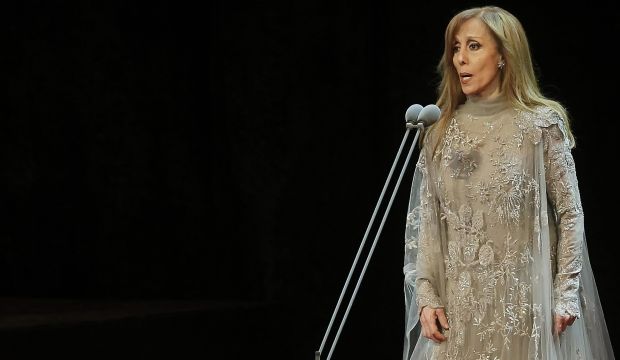
Lebanese diva Fairuz performs during a rare concert in Beirut on October 7, 2010. (Joseph Eid/AFP/Getty Images)
Beirut, Asharq Al-Awsat—The delayed renovation project to turn the childhood home of Lebanon’s legendary singer Fairuz into a museum will begin by the end of this year, the mayor of Beirut said.
“When maps and the tender documents for the house repairs are ready, we can start implementation. This will happen at the end of this year,” Mayor Bilal Hamad told Asharq Al-Awsat.
The Beirut municipality first announced it would restore the house and turn it into a museum in 2010. Work has since been delayed by multiple bureaucratic procedures including the transfer of ownership to the state. The municipality has still not gained possession of the house.
Hamad says that the State Ownership Committee needs to value the building before the municipality can take ownership. “We will try to accelerate our procedures as much as possible. After the price estimation is completed by the concerned committee, we will transfer the sum to the original owner,” Hamad said.
The mayor emphasized that the authorities are determined to establish a museum that does justice to Fairuz and her story as one of the Middle East’s most celebrated singers.
“When we say ‘Fairuz’, we feel as if we are talking about Lebanon or the Lebanese cedars, as Fairuz is considered our ambassador worldwide and is an icon who has raised the Lebanese flag high regionally and internationally,” Hamad said. “The least we can do for her is to honor her in a manner that befits her stature.”
Fairuz spent her childhood in the house in Beirut’s central Zuqaq Al-Blat neighborhood. It is said that she used to sit near a window that overlooked the garden to listen to songs by Arab music greats such as Umm Kalthoum, Mohammed Abdel Wahab, Asmahan and Layla Murad being played on the neighbor’s radio while she crooned along softly.
The house cradled the young Fairuz’s voice before Mohammed Flayfel—a well-known musician and teacher at the Lebanese conservatory—discovered her talent during a school choir recital in 1946 and projected her into the limelight.
The building dates back to the beginning of the nineteenth century at the time of the Ottoman Empire. Naji Raji of Save Beirut Heritage, a group that lobbies to prevent the destruction of the city’s old buildings, says Fairuz lived on the ground floor of the house, which now consists of another floor that was added later. However, after many years of neglect the building is now falling into disrepair.
“The house is located in the midst of a small garden and consists of two rooms with their annexes and ceilings decorated with arches inspired by traditional Lebanese architecture. As for the floor, part of it is covered by mosaic, whilst the rest is covered by clay,” Hamad said.
Fairuz herself has been consulted over plans for the proposed museum. “We in the Beirut municipality do not want to take a single step forward without prior agreement from Fairuz,” said Hamad.
The mayor said the museum is expected to contain videos of her plays, and perhaps the dresses she wore in her performances. “All these ideas are still mere suggestions which we will present to Fairuz who will have the final say on whether this can be put into effect or not.”
Lebanese Minister of Culture, Rony Araiji, said the ministry was working toward placing the building on the State Ownership list. “We fully support the Beirut municipality in this regard, and it is the Lebanese Ministry of Culture’s duty to sponsor all museums to be established in the country,” however, he added that “making a decision and implementing the issue depends directly on the Beirut municipality.”
Araiji, who said he had become well acquainted with Fairuz after being appointed minister of culture last year, hoped the standard procedures required to establish the museum would be accelerated so that the Lebanese can enjoy the museum as soon as possible.

